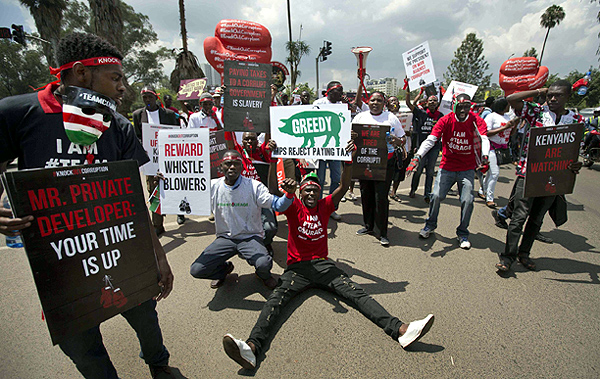
OnSafari: NAIROBI. As I wait for my group to arrive it’s impossible to have a single conversation with any Kenyan that doesn’t ignite almost instant anger about corruption. Uber driver, hotel clerk, hotel maid, tourism executive … everyone is livid with recent revelations, and a few of them involve America.
Kenya has always been demonized for its corruption and I’ve often defended the culture by simply pointing out that corruption exists everywhere. The virtual scale of corruption in places like the U.S. eclipsed almost anything that happened here.
And the annoying police bribes and bribes to petty government officials just to get your name on a list or a license that you’re due have been massively reduced. Good news, eh? Yes, but then in the last few years Kenya has started to behave like any other great corrupt nation.
The new scale of corruption manifest here just as the country was succeeding in ending petty corruption is mind-boggling, and the public is enraged.
The poster project for all the dozens of scandals is a central Kenyan damn project estimated to cost around $650 million. About $200 million has already been spent, with absolutely no visible results and evidence mounting every day that 80-90% of that has made its way into Kenyan politicians’ pockets.
Even as the “war against corruption” initiated last year by the Kenyatta administration is making progress: The corruption SWAT team has descended on European capitals and discovered that many European aid projects are being swindled in a most clever and ruthless way.
After grant money was allocated to a certain project, Kenyan politicians flew to the foreign lands where as is traditional the hardware for the project is then purchased. But then instead of buyinig steel and nails, they set up companies with foreign nationals named as directors, while retaining complete and hidden control of the company themselves.
At best – which is unlikely – they simply benefit as any company would from providing material and services to some project. What the corruption SWAT team has discovered, however, is that the funds are then just pocketed by the politician.
“What we were surprised about was the level of rot. We award tenders to international companies only to discover they belong to locals.”
And, of course, the project goes nowhere.
Promised dams, schools, roads — you name it — never occur. The public is furious.
Several American firms are implicated. New York-based Seabury was hired four years ago to turnaround failing Kenya Airways, which has only lost more and more money since, including questionably large fees to Seabury.
Kenya’s National Bank has been implicated in all sorts of scandals. Along with Kenya Airways, the bank has paid questionably high fees to another New York firm, McKinsey, for nearly three years.
Mind you there is little hard evidence available in the Kenya culture of massive corruption, so virtually everything remains allegation. But as time goes on and airlines crumble, dams aren’t built and even the smallest of projects don’t appear, deduction of the obvious has infected the angry public.
I think the reason for this massive upsurge in corruption is because of the growth the country has enjoyed recently. Development on a scale never imagined has thrown railways and roads all over the country. That’s attracted foreign investment in significant amounts. That’s greatly enriched the country.
But even these massive infrastructure projects are now under attack. Virtually all of them have been financed by China, and worries are growing that the agreed payback is too severe and was agreed to by corrupt politicians paid off by China.
So now a Kenya-American professor claims to know what to do. He’s going to run for president.
Makau Mutua has been a professor of law at Harvard and currently serves on a number of American legal groups. He was recently the Vice President of the American Society of International Law.
What’s interesting is that Mutua seems to have drilled into the significantly wealthy Kenyan diaspora in America. The rumors here in Nairobi are that Kenyans in America are well-funded and organizing a coup from the outside using well established American techniques for winning democratic elections.
“We have extensive networks of clean and uncorrupted resources, both financial and moral,” Mutua admitted to Kenya’s Daily Nation a few days ago.
Right now Mutua delivers a clean speech: China is the new colonizer; corruption is rampant; Kenya is growing fast enough to satisfy basic needs… and he knows how to harness it all for the overall good of the country.
Meanwhile, back at the ranch, daily bribes of the sort that used to be necessary to get past a police check are way down. But billion-dollar dams are disappearing, instead.